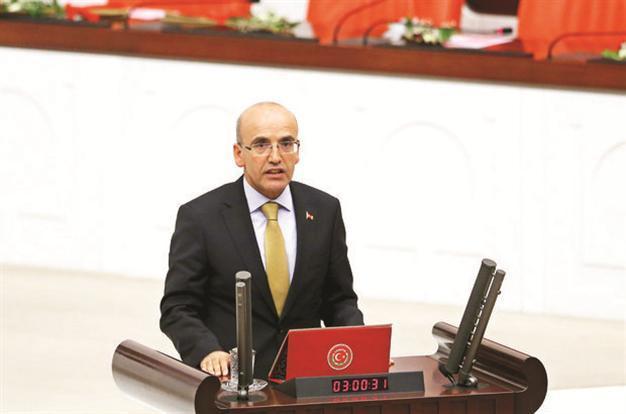Şimşek to become Turkey’s new economy tsar, as Erdoğan’s allies take key posts in administration
ANKARA

AA photo
Former Turkish Finance Minister Mehmet Şimşek will be in charge of the economy in a new cabinet named by Prime Minister Ahmet Davutoğlu on Nov. 24, becoming deputy prime minister in a team which saw close allies of President Recep Tayyip Erdoğan take key ministerial posts.A senior official told Reuters Şimşek, who has been seen as the architect of Turkey’s recent fiscal success and a credible reformist figure in the cabinet, would take over management of the economy, a post held in the past by Ali Babacan, who has been seen as fairly credible by the markets but was not appointed to the new cabinet.
“The economy administration matters a lot for Davutoğlu and he has established a strong economy administration. The existence of Babacan had made the new cabinet stronger, but Şimşek, who is also highly credible for the markets, will run the economy,” the official told Reuters.
Babacan, who frequently found himself at odds with Erdoğan’s demands to cut interest rates in recent months against the background of a plunging Turkish Lira and deep political uncertainty, was reportedly persuaded to continue his political career with the Justice and Development Party (AKP) in the Nov. 1 elections thanks to the personal efforts of Davutoğlu. However, Babacan was said to be unwilling to take part in the government if he was not given control over the economy.
Former Deputy Prime Minister Cevdet Yılmaz, who was responsible for economic affairs, has returned to the position he held before the June election as development minister.
Many of Erdoğan’s closest allies have been appointed to key roles in Turkey’s 64th cabinet. Istanbul deputy Berat Albayrak, Erdoğan’s son-in-law, who was also being touted for a possible role in economic management, was appointed as the new energy and natural resources minister. This ministerial position has been quite crucial in terms of its ongoing and projected business overload. Turkey plans to make over $135 billion in investments in the energy sector by 2023, former Energy Minister Ali Rıza Alaboyun said last week.
Another longstanding Erdoğan ally, Binali Yıldırım, was named the transportation, maritime affairs and communications minister again after a short break due to the AKP’s three-term limit. Yıldırım will adopt an overloaded agenda, as the country has set ambitious infrastructure targets which require the realization of several “crazy projects” to ensure economic growth and development.
Former Finance Ministry Undersecretary Naci Agbal and economist Mustafa Elitaş, both also seen as close to Erdoğan, were named as finance and economy ministers, respectively, in the new cabinet. Another AKP veteran and lawyer from the eastern province of Malatya, Bülent Tüfenkçi, has been named the new customs and trade minister.
Former Economy Minister Nihat Zeybekci did not take a place in the new cabinet.
Challenging issues on the table
The new economic administration will need to deal with a number of challenging issues in the economy after an extended period of elections. Top business leaders have long voiced their strong need for the realization of a robust reform agenda to enable the country to overcome a middle-income trap, shift the country’s production to a higher quality mood and increase both investments and exports in a highly fluctuating climate both inside and outside. Additionally, steep fluctuations in the lira’s value for the last two years have not helped the business world ahead of an expected rate hike by the U.S. Federal Reserve.
Many sectors have also been negatively affected from the rising security concerns around Turkey, including the tourism sector and exports. The country’s exports saw an 8.6 percent drop to $119.6 billion in the first ten months of the year compared to the same period of 2014, according to semi-official data. Tourism revenues in Turkey declined 4.4 percent to $12.29 billion in the third quarter, the Turkish Statistics Institute (TÜİK) said on Oct. 30, amid security concerns and a decrease in the number of Russian tourists visiting the country.
With the most recent crisis with Russia, the situation will become worse, according to leading business figures, as specifically the tourism and energy sectors are expected to be affected most.
After the preparation of a temporary budget, the new economy administration needs to focus on these issues, according to business leaders.
















